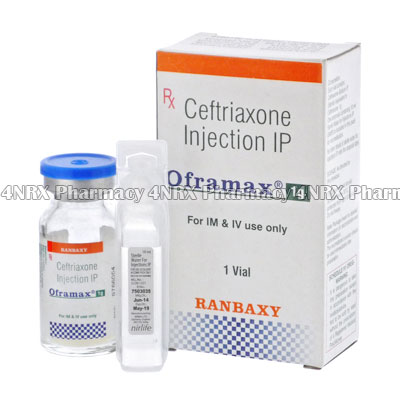 |
Home  Infection Infection  Oframax Injection (Ceftriaxone) Oframax Injection (Ceftriaxone) |
|
|||||||||
|
|
Oframax Injection (Ceftriaxone)
What is Oframax Injection (Ceftriaxone) used for? Oframax Injection (Ceftriaxone) is an injectable antibiotic used to treat a wide variety of bacterial infections that may be severe or life threatening. The medication destroys or slows the reproduction of bacteria cells so that the immune system may eliminate the infection. It is normally prescribed to treat pneumonia, gonorrhea, skin infections, meningitis, soft tissues infections, or to prevent bacterial infections following surgery. Your physician may also use this medication to treat other unlisted conditions. How should I use Oframax Injection (Ceftriaxone)? Oframax Injection (Ceftriaxone) should be injected by your physician or a fully trained health care professional. The correct dosage and frequency of administration will depend on the condition being treated, your current health, and the severity of your symptoms. If you are required to perform your own injection make sure you are fully instructed in the correct procedure by your physician. Sterilize the injection site and needle before each application. Collect the prescribed dosage of solution, insert the syringe into the muscle or vein, and press the plunger slowly allowing the medication to disperse. Always observe the solution prior to each use to ensure it is not cloudy or discolored as this may indicate contamination. Do not stop using the medication before being instructed to do so, even if your symptoms seem to have disappeared, as the infection may not be gone and can return stronger or more resistant to treatment. Ask your pharmacist or physician any questions you have about the medication to make sure you are using it correctly. What are the side effects of Oframax Injection (Ceftriaxone)? Side effects that may occur in some patients using Oframax Injection (Ceftriaxone) include:
Serious side effects that may require immediate medical attention are sensitive skin, easier bruising, severe pain at the site of injection, fever, flu symptoms, severe skin rash, urinary retention, seizures, sores appearing in or around the mouth, darkened urine, discolored stools, or jaundice. Contact your physician as soon as you experience any worrying or intense symptoms to make sure the correct adjustments are made to your dosage or application frequency to prevent further complications from occurring. Please Note Do not begin using Oframax Injection (Ceftriaxone) if you are allergic to cephalosporin antibiotics, have a history of allergic reaction to penicillin antibiotics, or if the patient being treated is a young child or baby. Also inform your physician if you are on a controlled sodium diet, have decreased kidney function, or decreased liver function as these conditions may cause complications during treatment requiring special adjustments to your regimen. Strictly follow all instructions provided to you by your physician or pharmacist while using Oframax Injection (Ceftriaxone). Optimum and safe dosage can differ based on the patient and the condition being treated. As this medication may be unsafe for certain patients, it is essential you always inform your physician if you are pregnant or breastfeeding, as well as if you have any allergies, other illnesses, or ongoing health conditions, and if you are taking any other form of medication, supplements, or herbal products. Immediately seek emergency medical care if you have an allergic or hypersensitive reaction. Common signs of a reaction include hives, swelling, skin rashes, chest pains, as well as trouble breathing or swallowing. 
|
||||||||||||||||||||||